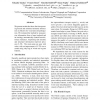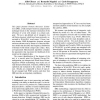18 search results - page 1 / 4 » Word Sense Disambiguation Based on Bayes Model and Informati... |
FGCN
2008
IEEE
13 years 11 months ago
2008
IEEE
Word sense disambiguation has always been a key problem in Natural Language Processing. In the paper, we use the method of Information Gain to calculate the weight of different po...
EMNLP
2007
13 years 6 months ago
2007
We present results that show that incorporating lexical and structural semantic information is effective for word sense disambiguation. We evaluated the method by using precise in...
SAC
2005
ACM
13 years 10 months ago
2005
ACM
Because of name variations, an author may have multiple names and multiple authors may share the same name. Such name ambiguity affects the performance of document retrieval, web ...
COLING
2002
13 years 4 months ago
2002
In this paper, a supervised learning system of word sense disambiguation is presented. It is based on conditional maximum entropy models. This system acquires the linguistic knowl...
EMNLP
2004
13 years 6 months ago
2004
This paper presents Domain Relevance Estimation (DRE), a fully unsupervised text categorization technique based on the statistical estimation of the relevance of a text with respe...


